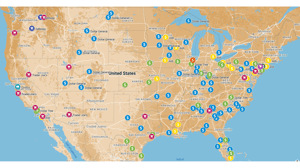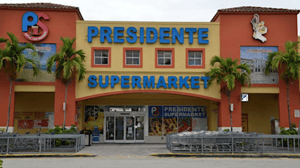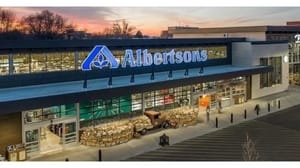FLEMING SAYS ITS LIQUIDITY CAN COVER ALL SUIT DAMAGES
OKLAHOMA CITY (FNS) -- At a contentious annual meeting, officials at Fleming Cos. here assured shareholders that the company's financial health is stable. Fleming Cos. has enough liquidity to operate its business despite the fraud and breach-of-contract judgment awarded David's Supermarkets and the possibility of damages from future investor lawsuits, officials said."We always had and we still have
May 13, 1996
DON YAEGER
OKLAHOMA CITY (FNS) -- At a contentious annual meeting, officials at Fleming Cos. here assured shareholders that the company's financial health is stable. Fleming Cos. has enough liquidity to operate its business despite the fraud and breach-of-contract judgment awarded David's Supermarkets and the possibility of damages from future investor lawsuits, officials said.
"We always had and we still have an ample amount of liquidity," said Harry L. Winn Jr., executive vice president and chief financial officer. "It is
in excess of $150 million, and that is after considering the $230 million potential impact of the David's suit. That is enough to cover our busy holiday season needs and have money to spare. Remember, we've paid no cash out to David's. We just put up a bond."
Answering a query about interest payments on Fleming senior notes, Winn said, "We have adequate finances to meet all of our obligations. I am comfortable we will continue to make those payments." Robert E. Stauth, chairman and chief executive officer, responding to a shareholder question, dispelled the possibility of bankruptcy. "There is no reason for Fleming to consider bankruptcy -- not under the circumstances we're under today, clearly not," he said, noting that financial trends in the first quarter of 1996 were "clearly superior" to the last half of 1995.
Asked if the company carries insurance coverage on the pending lawsuits against Fleming, David Almond, senior vice president and general counsel, said such information could not be disclosed publicly.
After the meeting, Fleming officials declined to comment on prospects for successful mediation with Grandview, Texas-based David's, citing gag provisions of the Texas Deceptive Practices Act. However, despite an unsuccessful three-day meeting last month, a mediation session between the two parties is slated for late this month, said attorney Jeff Joyce of Winstead, Sechrest & Minick, Houston, which is representing Fleming.
Earlier, Joyce told shareholders, "We have many good points to raise in our appeal," a process expected to take two to three years.
Stockholders, smarting from declining share prices and a dividend reduction, peppered speakers with questions -- unlike the sanguine atmosphere of previous Fleming meetings. Some of the more than 500 attendees took exception to the Fleming Flexible Marketing Plan, the wholesaler's re-engineering project that changes the way retailers are billed for products and services.
Countering positive comments by retailers in a film presentation, Steve Fleming, a son of company founder Ned Fleming and a retailer who owns three stores in Texas, said "everything is not rosy" with FFMP. He told the audience that more than 50 retail customers were lost in south Texas to Grocers Supply because of glitches and excessive costs in the plan. "A lot of out-of-stocks and very poor produce are driving us to a second supplier," he said.
His brother, Jim Fleming, who described himself as the oldest living son of the founder, said facetiously to company executives, "Your PR team is excellent." Further addressing management, he added, "Over the last four weeks there have been nothing but bad comments about the company. Associates are downtrodden. The job you've done is deplorable. Shame on you."
Stauth defended the company's course, noting that "old business practices would not take Fleming into the future." He said FFMP is "fundamentally sound" but is being slowed for refinements after implementation in 17 divisions. No time line has been set for completion of the rolling out of the concept to other divisions, he noted. The original goal was to have the program installed in all divisions by first-quarter 1997.
To improve sales and earnings, Stauth said, the company must "continue to adjust to changes in the industry that we saw coming and that have accelerated over the last year. We must respond to both the declining base of independent retailers and the accelerated shift manufacturers have made to every-day-low-costing. We saw the EDLC trend coming, and it was a major factor in developing our new [FFMP] concept. Manufacturers, however, are moving much faster in this direction than we had anticipated."
Only about 30% of grocery, frozens and dairy business was affected by EDLC at the start of last year, according to William J. Dowd, president. "By the end of the year, about 60% of this business was on some form of every-day-low-costing," he said.
To counter the decline in business resulting from fewer independent customers, Fleming plans to court nontraditional types of businesses and to expand the business of its company-owned retail stores, Dowd said. "We're seeing interest from new classes of trade: small-to-medium wholesalers, convenience stores and chain drug stores."
Asked after the meeting if there was net sales growth from new accounts, Dowd said, "We are close to stability." He noted a "major new account" in the first quarter when Family Co. of America selected Fleming to supply 23 National Markets in the St. Louis area. He added that Schwegmann Giant Super Markets, New Orleans, "has just signed on-board for us to supply more than 1,000 items to their 43 stores, a piece of business totaling more than $20 million in sales."
More than half of Fleming's $130 million in capital expenditures this year is earmarked for major remodels at 30 stores in the firm's company-owned 12 regional grocery chains. Last year's capital program totaled $114 million.
In a departure from its usual practices, Fleming barred news reporters from its annual shareholders meeting, offering instead to provide information about the meeting at a later press conference.
A contract reporter representing Supermarket News and a representative of the Wall Street Journal were permitted to attend the shareholders meeting itself because they held proxies; others were admitted to the press conference only.
About the Author
You May Also Like




